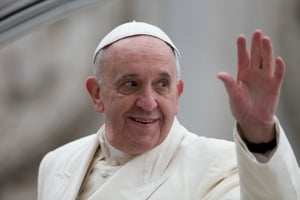Pope visits Zionist's tomb
He lays wreath in 1st trip by a pontiff to founder’s grave
Tuesday, May 27, 2014
JERUSALEM -- Making history for the second day running, Pope Francis laid a wreath Monday on the grave of the founder of Zionism, becoming the first pope to do so, a gesture of support to Israel after several symbolic signals the day before that lent a spiritual lift to Palestinian aspirations for sovereignty.
The visit was part of a marathon morning tour of Jerusalem in which Francis took off his shoes to enter the Dome of the Rock and later stood for several minutes with his right palm on the ancient stones of the Western Wall before placing a note between them. At the Yad Vashem Holocaust Memorial, he kissed the hands of six Holocaust survivors as he heard their stories and, echoing a Jewish mantra, said: "Never again, Lord, never again!"
"A great evil has befallen us, such as never happened under the heavens," Francis said, quoting the Bible in remarks part prayer and part poetry. "Grant us the grace to be ashamed of what we men have done."
At the request of Prime Minister Benjamin Netanyahu, Francis added to his already packed itinerary a quick visit to a memorial to victims of terror attacks, perhaps in an effort to counterbalance the powerful lift he provided to Palestinians with an unscheduled stop Sunday at the concrete barrier dividing Bethlehem from Jerusalem.
"I explained to the pope that building the security fence prevented many more victims that Palestinian terror, which continues today, planned to harm," Netanyahu said after the visit, where he pointed out the tablet commemorating the 85 people killed in a 1994 bombing at the Jewish center in Buenos Aires, Argentina, the pope's hometown.
According to a text message from the prime minister's office, while standing at the site, Francis said: "Terrorism is absolute evil. It stems from evil, and it results in evil. Never again! Never again!"
The pope's itinerary included meetings with Netanyahu and President Shimon Peres of Israel, who has accepted his invitation for a peace-prayer summit meeting with President Mahmoud Abbas of the Palestinian Authority in the Vatican next month.
Asked why Francis had invited Peres, whose position is largely ceremonial, rather than Netanyahu, who is Abbas' counterpart in peace talks, the Vatican spokesman said the pope and the Israeli president had developed a warm relationship of "great esteem" and Peres had urged him with "great insistence" to visit the Holy Land before his term expires in July.
The crammed schedule -- nine stops in five hours -- started the final leg of the 77-year-old pontiff's three-day sojourn through the Holy Land, which the Vatican had described as a "purely religious" pilgrimage but in which he also waded into the region's politics.
On Sunday, Francis became the first pope to travel directly into Israeli-occupied Palestinian territory and to call it the "State of Palestine," affirming the 2012 United Nations resolution upgrading its status. An unscheduled stop provided the defining image of the day, when the pope touched his forehead to the graffiti-scarred concrete barrier dividing Bethlehem from Jerusalem. Israel calls the barrier essential for its security, while Palestinians loathe it as a symbol of the way the occupation restricts their daily lives.
The itinerary Monday offered something of a counterpoint, particularly the visit to the grave of Theodor Herzl, whose appeal to Pope Pius X when they met 110 years ago for help in establishing a Jewish state was harshly rejected, with Pius suggesting that Jews convert to Christianity. Flanked by Peres and Netanyahu, Francis placed a large ring of yellow and white flowers -- Vatican colors -- atop the large square tomb, then added a stone, following a Jewish custom, and bowed his head for several minutes.
Stops at Herzl's grave have recently been added to the routine protocol for visiting heads of state, but Netanyahu nonetheless embraced Francis' visit as a significant step, telling the pope at Sunday's welcome ceremony in Tel Aviv, "We admired and appreciate your decision" to do so.
Also Monday, the head of Lebanon's largest Christian denomination visited a parish in central Israel, becoming the first Lebanese religious leader to come to the Jewish state since its creation in 1948.
Cardinal Bechara Rai, a Maronite Catholic, made the trip despite opposition at home. His critics have said the pilgrimage implies normalization with Israel at a time when the two countries remain formally at war. However, others said the Lebanese are preoccupied with different concerns, such as electing a president and containing the spillover from the civil war in neighboring Syria.
Rai said his journey, tied to Francis' visit, celebrates the roots of Christianity in the region.
Archbishop Paul Sayah, a senior Maronite cleric, added that Rai's visit is purely religious. He said it is not linked to "the regrettable situation that exists between Lebanon and Israel."
Israel has invaded Lebanon several times, occupying part of the neighboring country's territory for 18 years until it withdrew in 2000. In 2006, a 34-day war between Israel and Lebanon's Hezbollah group left 1,200 Lebanese and 160 Israelis dead.
Information for this article was contributed by Jodi Rudoren of The New York Times and by Ami Bentov, Karin Laub and Ryan Lucas of The Associated Press.
A Section on 05/27/2014
